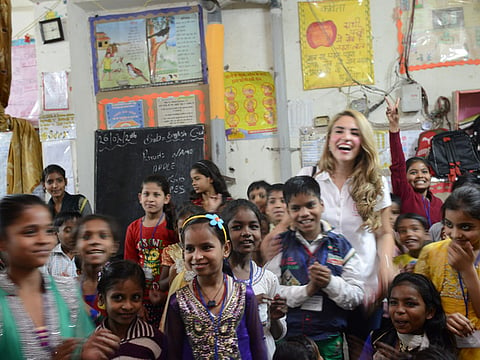Mumpreneurs: From running a family to running a business
An increasing number of mothers are turning to entrepreneurship to strike a work-life balance

It’s tough to run a business. It’s also tough to run a family. But there’s a growing number of women ready to take on the double challenge.
Mum entrepreneurs, or ‘mumpreneurs’, seem to have hit the sweet spot when it comes to balancing an exciting job with maintaining family commitments.
Being mothers isn’t a drawback for these mumpreneurs, it’s an advantage. Their husbands and children are not just supportive, they are often a part of or the inspiration for their business ideas.
Take Jumana Al Darwish, for example. Having worked in the government and non-profit sector for over nine years, Al Darwish developed her business idea from the ‘happy boxes’ she was making for her two-year-old daughter.
Filled with craft or colour activities, these boxes gave her daughter a creative way to improve cognitive and motor skills. Today, Al Darwish and her sister-in-law, who is also a mumpreneur, run The Happy Box, an education company specialising in activity boxes for children.
“I reached a point where I loved what I did, I loved my job but I was missing out on some beautiufl moments with my daughter,” Al Darwish told Gulf News.
“I started The Happy Box to have more flexibility in my life and watch all the beautiful moments and milestones in my daughter’s life,” she said.
Not only do the boxes allow children to learn through fun activiies, they also become an opportunity for the entire family to spend time together. Her dauther, who Al Darwish calls the Chief Confetti Officer of her company, gets to test new activities that they plan to roll out.
Another aspiring businesswoman, Bhavna Kewalramani, spoke about how her husband and two-year-old daughter gave the push she needed to pursue her dreams. A banker for over seven years, the 30-year-old launched her label Aarzu Dubai in February this year.
“I’ve always had the thought that I didn’t want to be an employee my entire life. After I had a baby girl I started realising how much fun it is to sit and dress up a little girl and I thought to myself: I’m not working anymore why not dress people up because I love doing that?” Kewalaramani told Gulf News.
But is starting a home business really that simple? According to Kewalramani, as long as you have your goals in sight, there is no scarcity of inspiration and support. Being a stay-at-home business owner is a lot easier for her at a time when online communities are becoming more and more vibrant.
“The thing about being an entrepreneur is that it’s a one-man show. You have more of a pressure to keep yourself satisfied, you’re not satisfying anyone else. At the end of the day, you can tell yourself that you did a good job or you could have done better. It’s a challenge for yourself. And of course, you get to set your own work time. I know I can give my daughter a lot more time, I can wake up in the morning and spend time with her and if I know she takes a nap between 2-4, I’ll schedule my work at that time. I can explore more, I’m not restricted to a desk job,” she added.
For Minakshi Nagu, however, entrepreneurship happened by chance. Having worked for over 20 years, Nagu decided to quit when the demands of work got too much.
“I had worked all my life, my children were all grown up and in fact were working as well. The commute was also too much. It’s never really a nine-to-five job, it’s really a nine-to-nine job here,” Nagu said.
Her hobby for stitching and needle work then laid out the next phase of her career.
“I started doing more of that so things like purses and shirts just started getting collected. One day, my daughter said: ‘Why are you collecting? Just sell it.’”
That was the start of Ragmatazz, a patchwork factory that creates colourful clothes, purses and bags. Through pop-up markets and her marketing-savvy daughter’s support, Ragmatazz has gone on from Nagu stitching together discarded pieces of embroidery in her garage-turned workshop, to a licensed enterprise employing three tailors.
“We would go to pop-up markets and it was all fun and games. We would spend more money and make less. Gradually, we realised people were liking it, and it was very encouraging. It soon became a brand and people started coming asking for us. The whole thing kind of grew from there,” Nagu said.
The fact that most of these businesses are so deeply intertwined with their family life gives themimmense stability. Additionally, these businesswomen are not just looking for job satisfaction or revenues, for each of them, the final goal is a lot bigger: happiness. And in that pursuit, there is no space for regrets.
As The Happy Box co-founder Jumana Al Darwish puts it: “I have never been so fortunate to have met so many mumpreneurs that have supported one another. You have an incredible sphere, where everyone is suppoprtive because all mothers understand the importance of flexibility. Ever since I decided to start my own business, I’ve never looked back. It’s the best thing I’ve done, really.”
Sign up for the Daily Briefing
Get the latest news and updates straight to your inbox



